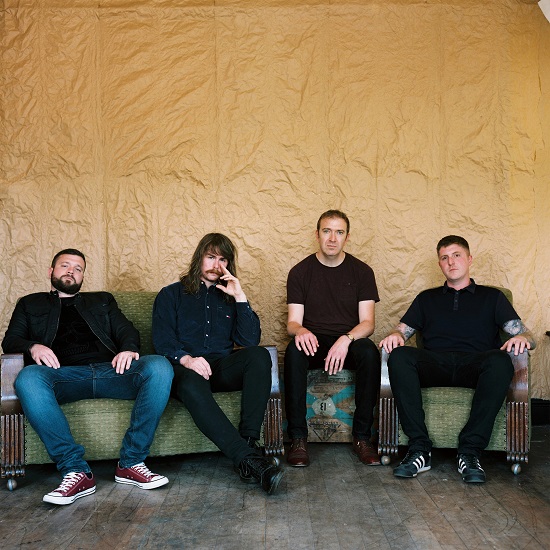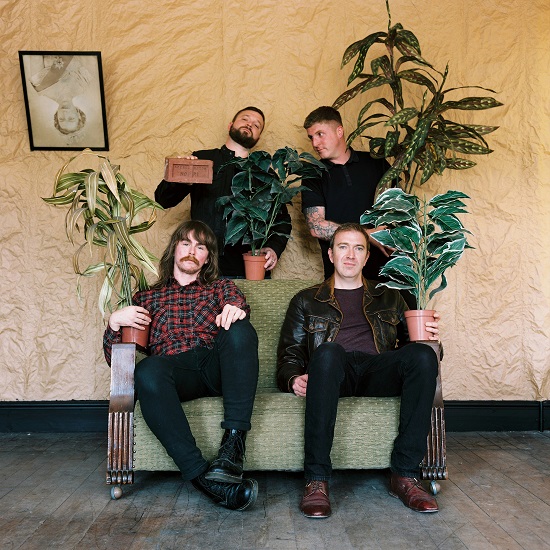Photo by Daniel Scanlin
When Mark E. Smith died in 2018, one of the greatest bands in British history, The Fall, died with him. Dave Spurr, Keiron Melling and Pete Greenway were the last and longest-serving line-up of the 66(ish) permanent members of that most brilliantly irresolute of rock bands. They served together throughout what turned out to be The Fall’s final phase, from 2008’s tremendous Imperial Wax Solvent, through to Smith’s brutal swansong, New Facts Emerge. Consistency became almost a dubious honour, and there were whispers among some Fall fans that Smith’s new-found disdain for mass sackings might be a sign he was losing his edge. Yet the Spurr/Melling/Greenway-era of The Fall – which also included Elena Polou and others for extended stints – gave birth to some of the best music the band ever produced. 2010’s Your Future Our Clutter, for example, remains the last truly spectacular Fall record.
The gigs were ferocious too. tQ was in attendance at one of the very last, where Smith, suffering heavily from cancer by this stage, his face visibly swollen by treatment, spent only ten minutes of their set at The 100 Club onstage before vanishing to finish the gig from his dressing room. Spurr, Melling and Greenway stayed on, almost unflinching, as they hammered through a tightly wound and ruthless set that stood firm amid pandemonium from the crowd, goaded by Smith’s partner Pamela Vander who had decided to front them in his absence.
All of this is to say that when Smith died, he did not just leave behind three disposable sidemen, but an accomplished band in its own right, as live performers and on record. Spurr, Melling and Greenway have duly reunited to keep going under the name Imperial Wax, a nod to their first record together, along with newly enlisted frontman Sam Curran, established musician with the likes of Black Pudding. Their debut album Gastwerk Saboteurs arrives on 17 May, which continues the progression into searing garage rock that they had established over six The Fall LPs.
There first came a period of mourning, however. “I didn’t really want to be in a band after The Fall had finished,” says Spurr. “I couldn’t pick my bass up for about a month afterwards, I just couldn’t face it. It was like rock and roll had died or something. It was about four months after Mark had died that we all missed what we were doing together.”
“The band was part of a grieving process,” says Melling. “Getting together and doing it still made us feel like everything was gonna be OK. I was just on a downer for quite a while. It’s kind of still the same, we think about him all the time but instead of being down about it it’s more positive, talking about all the good times, he was a funny guy.”
The pair are tight-lipped about their specific memories of their time with The Fall, as if bound by some sort of pact of silence. “There’s some great stories that I probably couldn’t tell, I can’t think of anything PC enough,” says Melling as he dodges questions with a laugh.
“What happens in The Fall stays in The Fall!” says Spurr. The bassist does, however, recall his ‘complete disaster’ of a first gig, where he instantly blew up an amp after a few seconds, went back to the hotel and drank a bottle of whiskey – fortunately the band had two bassists at the time – while Melling remembers his bafflement when at his second show, Smith had enlisted a second drummer behind his back – but both say their fondest memories are backstage, relaxing with a beer.
Their deep sense of pain when it comes to that final run of shows is still bare, however. Such was the ferocity with which Smith ploughed on and on through live performances against the force of death itself, sometimes bound to a wheelchair, his eventual passing came as a shock. “We didn’t expect Mark to die,” says Spurr. “We knew he was really poorly but it was such a shock to us. We all thought he was gonna get better, shake it off and carry on. He was talking about going back in the studio, doing gigs and all sorts of things.”
“He’d been ill before and just got through it,” adds Melling. “He was still doing gigs, still recording, it meant nothing to him. The last time I saw him that was a pretty hard moment. I still believed it’d be alright. He looked ill and had no energy but I thought it was all the chemo taking it out of him. We were talking about the next LP he’d already arranged with Grant Showbiz and he was talking about hiring a big house in the Lake District and setting it up as a recording studio. I don’t know if he knew more than we did, and was trying to keep us going by giving us this hope we were gonna be moving forward.”
Melling and Spurr paint a picture of a sensitive, caring, if occasionally grumpy Smith that went unseen beyond the curated, aggressive image he portrayed to the public. “It was good for him to have that persona,” says Melling. “People knew not to mess about, especially at shows with promoters, dealing with contracts and stuff like that, but behind closed doors, and he’d probably hate it if I told people this, he’s a nice fella! He cared a lot about people, and what people thought about him. I think he was quite sensitive. If he thought he’d upset someone he cared about, it would cloud his mind… Hang on, I’m giving away all his secrets here!”

Photo by Daniel Scanlin
Six months or so after the end of The Fall, these fond memories led to the re-activation of the band’s old WhatsApp group; Mark E. Smith, it goes without saying, was not a member and would demand that someone else lend him their ‘portaphone’ when he needed to make a call. The trio took things casually until they were invited to be the backing band for former Fall muse Damo Suzuki at one of his improvised shows. It was the first time they’d jammed together since Smith had been at the helm. They had turned down offers to perform as a glorified covers band, and the idea of carrying on as The Fall was out of the question, but with their name they decided to maintain a clear link to their foundations. “The Fall died when Mark did,” Spurr says. “It wasn’t our place to do The Fall stuff, Mark was The Fall and when he passed away The Fall went with him. Imperial Wax is a nod to Mark, for all the things he’s done for us. We wouldn’t be together if it wasn’t for him.”
Sam Curran was eventually enlisted as frontman after a chance meeting with Melling at a beer festival in Cologne. “I’d heard a few of his bands he’d been in before but I didn’t know he was in every single one of them, which is weird because it’s the same voice. It was one of those random things I’d not put together really. Anyway, Sam came up to me at this beer festival and introduced himself and told me that he was in Black Pudding, and I was like ‘ooh yeah I like Black Pudding.’ A few months later when we were getting the band together we were trying to think of people and we’d gone through a ton of ideas of who we could get. An audition thing felt a bit weird for us, then I remember I’d met Sam. I didn’t want to poach him from his other band but I ended up sending him a message to ask if he’d be interested in working with us. That’s it really, we got Pete to come back up north from Stourbridge, we had a little rehearsal and it worked. We got Sam to do ‘Drop Out Boogie’, a song everyone might know, but we didn’t realise that the vocal’s a bit mental, isn’t it? He had a good go, though, so that was that!”
Three quarters of Imperial Wax were already well-drilled. Spurr and Melling’s history as a rhythm section goes back 25 years, to “all sorts of crap bands” before Spurr brought Melling into The Fall. They approached sessions the same way they always did, says Spurr, a “military operation” that took some adjusting for outsider Curran. “If we have to sack him, we have to sack him!” He jokes. “We might end up having 50 different frontmen, I’ll bear that in mind actually…”
“It didn’t feel that weird not having Mark there,” says Melling. “He always gave us a good bit of leeway to come up with what we come out with, he’d leave us along for a bit ‘til we’d got a few things down, then he’d come in and start with ‘let’s try this’. Then also, like on New Facts Emerge, ‘Couples Vs Jobless Mid 30s’, that was us sat in a hotel room after a show one night and Mark had this mad idea, explained it as a ‘rock opera’, then we went in to the studio and just did it, whatever came out came out.”
The result is a record that in many ways picks up where this iteration of The Fall left off, instrumentally at least, albeit with added heaviness thanks to the addition of Curran on guitar. Live, too, we can expect more of the brilliant sense of tension and power that characterised that band’s final decade. “However bad your week’s been it’s all gone after the gig,” says Melling. “It’s probably a bit heavier than we went with The Fall, but not metal or anything!”
“There’s still the same amount of brutality," says Spurr. We just don’t have Mark walking about and pissing about with our amps any more!”
Imperial Wax’s debut album Gastwerk Saboteurs is out via Saustex Records on 17 May. The band are on tour throughout the UK from 30 May to 14 June, and throughout Ireland from 6 to 9 November. For full dates and tickets click here.




